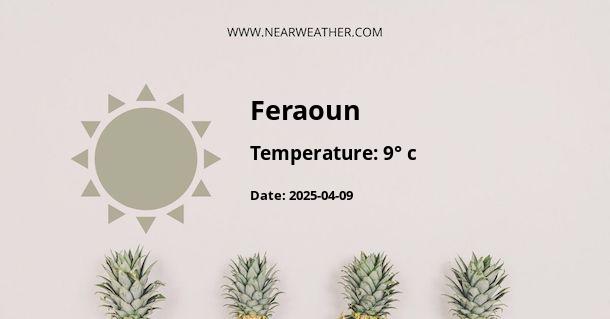Feraoun Weather Today
Daily Weather Forecast & Temperature in Feraoun
Sun & Moon
Location Info
Embed This Weather
Feraoun, DZ: A Guide to Its Climate and Weather Year Round
Feraoun is a small town located in the Guelma Province of northeastern Algeria. Situated at an elevation of 1,200 meters above sea level, Feraoun experiences a Mediterranean climate characterized by mild winters and hot summers. In this guide, we will explore in detail the climate and weather patterns of Feraoun throughout the year.
Temperature
The average temperature in Feraoun varies significantly between the seasons. Summers are generally hot, with temperatures often exceeding 30 degrees Celsius (86 degrees Fahrenheit). The peak of summer, which falls between July and August, can see temperatures soaring above 35 degrees Celsius (95 degrees Fahrenheit). On the other hand, winters in Feraoun are mild, with average temperatures ranging from 10 to 15 degrees Celsius (50 to 59 degrees Fahrenheit).
Here is a table summarizing the average monthly temperatures in Feraoun:
| Month | Average Temperature (°C) |
|---|---|
| January | 10 |
| February | 11 |
| March | 13 |
| April | 16 |
| May | 20 |
| June | 24 |
| July | 28 |
| August | 28 |
| September | 25 |
| October | 20 |
| November | 15 |
| December | 11 |
As shown in the table, the hottest months in Feraoun are July and August, with average temperatures reaching 28 degrees Celsius (82 degrees Fahrenheit). The coldest months are January and December, with average temperatures around 10 degrees Celsius (50 degrees Fahrenheit).
Precipitation
Feraoun experiences a Mediterranean climate in terms of precipitation, with most of the rainfall occurring during the winter months. The town receives an average of 600-700 millimeters (23-28 inches) of rainfall annually. The wettest months are between November and February, with December typically being the wettest month.
Here is a table illustrating the average monthly precipitation in Feraoun:
| Month | Average Precipitation (mm) |
|---|---|
| January | 80 |
| February | 70 |
| March | 60 |
| April | 40 |
| May | 20 |
| June | 10 |
| July | 0 |
| August | 0 |
| September | 10 |
| October | 40 |
| November | 70 |
| December | 90 |
From the table, it is evident that the wettest months in Feraoun are December and January, with average precipitation levels of 90 and 80 millimeters respectively. The summer months of July and August, however, receive little to no rainfall.
Sunshine Hours
Feraoun enjoys a considerable amount of sunshine throughout the year. The town receives an average of 3,000 hours of sunshine annually, which translates to around 8 hours of sunshine per day. The sunniest months are typically June, July, and August, with each month averaging around 10 hours of sunshine per day.
Wind Patterns
The wind patterns in Feraoun are influenced by its location near the Mediterranean coast. The prevailing winds in the region are the Mistral, which blows from the northwest, and the Sirocco, which blows from the south or southeast. The Mistral is a cold and dry wind, while the Sirocco is a warm and often dusty wind that originates from the Sahara Desert.
Conclusion
In conclusion, Feraoun experiences a Mediterranean climate with mild winters and hot summers. The average temperatures range from 10 to 28 degrees Celsius (50 to 82 degrees Fahrenheit), with the hottest months being July and August. The town receives an average of 600-700 millimeters (23-28 inches) of rainfall annually, with the wettest months being December and January. Feraoun also enjoys a significant amount of sunshine, with an average of 3,000 hours per year. The prevailing winds in the region are the Mistral and the Sirocco. Whether you're planning a visit to Feraoun or simply interested in the climate of the area, this guide provides valuable information about the weather patterns in Feraoun throughout the year.
What is the Latitude and Longitude of Feraoun?
Feraoun's Latitude is 36.560398 & Longitude is 4.854540.
What is the weather in Feraoun today?
Weather in Feraoun is 13° today.
What is the climatic condition of Feraoun today?
Climate Conditions in Feraoun shows scattered clouds today.
What is the humidity in Feraoun today?
Humidity in Feraoun is 84% today.
What is the wind speed in Feraoun today?
Wind speed in Feraoun is 9.65 km/h, flowing at 253° WSW wind direction.
What does it feel like in Feraoun today?
It feels like 12° in Feraoun today, with 46% cloud cover and 10 km visibility.
